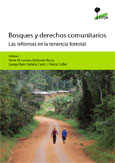Networks emerge as key actors in community forestry
-----------------
Community networks have emerged as an important force in enhancing forest tenure security and livelihood benefits for forest-dependent communities.
In many countries, such networks have become part of the forest tenure reform process. They develop at the grassroots level, and are proving to be effective agents for collective action.
The Federation of Community Forest User Groups, Nepal (FECOFUN), is one of the largest such organisations. It emerged along with the growth of community forestry in Nepal in the 1990s, and today represents more than 14 000 community forest user groups (CFUGs) across the country.
FECOFUN has supported CFUGs by, for example, developing and implementing management plans, staging rallies, running media campaigns and offering legal support and education. Its nationwide network and the broad populace it represents have helped it to challenge power imbalances between the forest bureaucracy and local communities. It has also increased user groups’ sense of security over their forest rights.
‘FECOFUN educated us about national forest policies and other legal issues that affect our relationship with the forest,’ says Hemraj Kafle, a community member in Nepal’s Jhapa district. ‘Their guidance has helped us to reclaim access to diverse forest products.’
FECOFUN is one of three community networks featured in a new book that offers an in-depth case study analysis of community forestry across the globe. ‘Forests for People: Community Rights and Forest Tenure Reform’, is the culmination of a 3 year study in 10 countries in 3 regions of the world – Africa, Asia and Latin America.
The research project, led and coordinated by CIFOR, examined 30 sites of differing size and characteristics.
‘In their early days, many of these community groups faced similar challenges in the form of institutional and technical hurdles,’ says CIFOR researcher Naya Sharma Paudel, who co-authored the book chapter on community networks. ‘They sought to take advantage of an informal sharing of ideas as a means of collectively overcoming these hurdles.’
Anne Larson, CIFOR associate and co-editor of ‘Forests for People’, notes that networks such as FECOFUN and the Association of Forest Communities of Petén (ACOFOP) in Guatemala have become key actors in the forest policy process.
‘These organisations have been important not only for the defence of community rights but also for opening communication between communities and the state forestry administration on a new level,’ she says.
In recent years, governments in developing countries have transferred at least 200 million hectares of forests to communities living in and around them. Now, more than a quarter of forests in developing countries are owned by or assigned to communities.
Tenure is particularly important in light of the ongoing global negotiations on REDD (reducing emissions from deforestation and forest degradation). For REDD schemes to be successful, clear usage and access rights and responsibilities over forest resources and carbon pools needs to be established so that efficient and equitable payments for carbon sequestration can be made. Communities will only benefit from these schemes if their rights are secured.
 |
|
---------------

